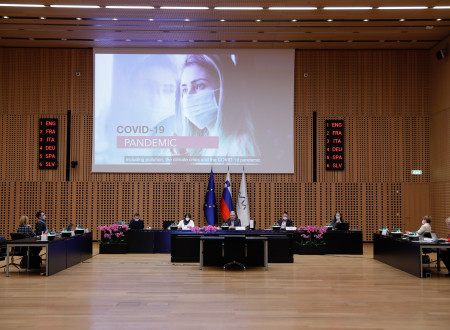By: UKOM
The Slovenian Minister of the Environment and Spatial Planning, Andrej Vizjak, chaired the virtual informal meeting of ministers responsible for urban development. With the adoption of the Ljubljana Agreement, the ministers supported further implementation of the Urban Agenda for the EU. Slovenia’s initiative to involve small and medium-sized cities more in cooperation and the policy-making processes, alongside large cities was therefore successful.
Minister Vizjak said: “Slovenia will support the implementation of the Ljubljana Agreement and the Urban Agenda for the EU, and actively include Slovenian towns and cities into multi-level cooperation, while striving to provide Slovenian towns and cities and other stakeholders with information about the events, initiatives and activities regarding the development of cities at EU level through its national contact point.” “The Ljubljana Agreement highlights the importance of the Urban Agenda for the EU and constitutes a political commitment to taking it forward,” he continued.
The informal meeting was also attended by the European Commissioner for cohesion and reforms, Elisa Ferreira. “I’d like to thank the EU Presidency Trio of Germany, Portugal and Slovenia for their tremendous efforts to renew the Urban Agenda through both the New Leipzig Charter and the Ljubljana Agreement. The Urban Agenda must be a catalyst for launching discussions and concrete solutions for better sustainable urban development at all levels. This is true in particular for the green transition, with cities being examples and role models for the broader region and must therefore exert leadership including clean transport and energy efficiency.”
EU policies and legislation have a considerable impact on the development of European cities, and the way cities operate has an impact on the successful implementation of EU policies. The EU Urban Agenda, established in 2016, is aimed at improving the quality of life in cities. Its partnerships bring together representatives of European cities and regions, member states, the European Commission and other European institutions who search for common solutions to improve and more effectively implement urban policies and to reach common European and national agreements. As much as 70 percent of all measures to deliver EU policy goals are implemented at local level. Slovenia has participated in six of the fourteen partnerships of the first generation.
The Ljubljana Agreement maintains the Pact of Amsterdam and introduces innovations that will further strengthen the impact and effectiveness of the Urban Agenda for the EU. It is still aimed at the removing barriers that cities face in the fields of regulation, funding and knowledge. It contains the fourteen thematic areas of cooperation and adds four new topics: “Urban Greening”, “Sustainable Tourism”, “Food” and “Cities of Equality”. At the same time, it invites citizens in 2023 to shed light on the development themes and issues from the perspective of the principles of the New Leipzig Charter (2020) to achieve green, fair and productive cities to the benefit of all citizens.
A major achievement of the Slovenian Presidency has been highlighting the role of small and medium-sized cities for balanced development and their equal involvement in EU policy-making processes.
In the afternoon, the ministers discussed the green dimension of urban development. They emphasised the importance of the work and the results of cooperation to date under the EU Urban Agenda Partnerships. The Slovenian Presidency presented the two years of work on communications behind the “green” partnerships of the Urban Agenda for the EU tackling improvements to EU legislation, which will also be submitted to the environment ministers for information in December. Germany presented the Three4Climate project, which has taken place over the last year and a half. Cities and schools from all three countries of the Presidency Trio participated in the project, aimed at raising awareness and drafting of action plans for the transition towards carbon neutrality. Portugal, which five years ago became the first country in the world to make the commitment to achieve carbon neutrality by 2050, presented its efforts and activities in this area.
Source: gov.si
